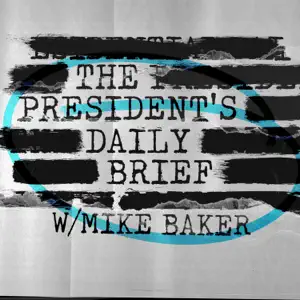
Time to end secret data laboratories—starting with the CDC
The American people are waking up to the fact that too many public health leaders have not always been straight with them. Despite housing treasure…
Thought Leader: Marty Makary

This piece is by WWSG exclusive thought leader, David Frum.
A first draft of this story opened: “It’s not every day that a candidate for vice president of the United States rage-tweets at you.”
Backspace, backspace, backspace. Although it’s not every day that a candidate for vice president of the United States rage-tweets at me personally, it is almost every day that Senator J. D. Vance rage-tweets at somebody. (I had tweeted, in part, this: “The difference: The upsetting things said by Trump and Vance are not true. The upsetting things said about Trump and Vance are true.” Vance responded: “I’d say the most important difference is that people on your team tried to kill Donald Trump twice.”)
But then here he was yesterday, for example, quote-tweeting one of the English-speaking world’s premier apologists for the Assad dictatorship in Syria, in order to assail Hillary Clinton. On September 14, he was mixing it up in the X comments with a reporter for The Intercept and the host of an online talk show.
In other words, to have J. D. Vance as your own personal reply guy is not such an accomplishment.
But it raises the question of how a nominee for vice president has so much time on his hands. Can you imagine, say, Dick Cheney, scrolling through his mentions, getting irritated, and firing off a retort? Neither can I.
So here’s my second draft: What we’ve been seeing from Trump-Vance is not the behavior of a winning campaign.
The day before Vance tweeted at me, former President Donald Trump was livestreaming to promote a dubious new cryptocurrency venture. That same day, he gave an interview to the conspiracy theorist Wayne Allyn Root in which Trump reverted to old form to denounce mail-in voting because the U.S. Postal Service could not be trusted to deliver pro-Trump votes fairly.
The day before that, the Secret Service had fired upon a man with a rifle near Trump’s West Palm Beach golf course. The apparent assassination attempt drove the headlines, but beneath the story was the reality that a candidate for president took a day off to golf only 50 days before Election Day.
Trump golfs a lot, and campaigns surprisingly infrequently. When he does campaign events, he makes odd choices of venue: Today, he will appear in New York’s Nassau County. New York State has not voted Republican for president since 1984. In 2020, Trump won 38 percent of the New York vote. Yet Trump has convinced himself, or somebody has convinced him, that this year he might be competitive in New York.
Yesterday, Trump posted a pledge on his Truth Social platform to restore the deductibility of state and local taxes. That’s an important issue for upper-income taxpayers in tax-heavy New York. Trump did not mention that he himself, as president, signed the legislation that capped state and local deductibility at the first $10,000, to help fund the Republican tax cut of 2017.
Vice President Kamala Harris has been driving a message of abortion rights and middle-income-oriented economic policy in must-win states. She sat for back-to-back solo interviews, both in Pennsylvania, the first with a local ABC affiliate, the second with the National Association of Black Journalists on the Philadelphia public station WHYY.
Trump’s main message of the week, meanwhile, has been that he was not wrong to accuse Haitian immigrants in Springfield, Ohio, of stealing and eating pets—a message that has put him at odds with the state’s Republican governor and local mayors and police chiefs. The only thing Trump said that made more impact were the four words he posted Sunday morning: I HATE TAYLOR SWIFT!
Adding to the self-harm, Vance indicated that the Trump health-care plan would allow insurers to resume denying coverage for preexisting conditions. Trump himself proclaimed that he would address high food prices by barring food imports—a policy guaranteed to raise costs instead. All but two Senate Republicans got baited into voting yesterday against a law to protect in vitro fertilization from state-level abortion restrictions. Meanwhile, Republicans in the House seem to be stumbling toward forcing a government shutdown because Trump vetoed their own plan to fund government operations through the November election. That’s all just in a single week.
Trump campaigns have always been festivals of grievances, eruptions of impulse. They also had, however, a kind of logic to them, whether intended by Trump or not. He voiced the resentments of a certain section of America that happened to be the section favored by the Electoral College. That alignment converted his 46 percent of the popular vote in 2016 into a 304–227 Electoral College win.
The question—in 2020 and, again, this year—has always been: Can the trick be repeated?
In the days following Trump’s Taylor Swift post, new polls for the first time showed Harris clearly pulling ahead of Trump—not only in the national popular vote, but also in individual swing states. Harris’s personal approval rating turned net favorable for the first time since the early months of the Biden presidency. Yesterday, a poll in Iowa showed Trump with just a four-point lead over Harris in that conservative-leaning state, down from an 18-point lead over Biden in a June poll.
Suddenly, it looks as if the Harris-Trump margin may not even be all that close—and that the Republican majority in the House may be at risk too.
Trump personally may not understand that he’s losing. His more cerebral running mate, Vance, does seem to have noticed, and that may account for the bitterness of his tone. Republicans don’t tend to offer second chances to unsuccessful vice-presidential candidates. After 2008, Sarah Palin had no future in politics. Dan Quayle’s bid for the presidency in 2000 fizzled before it started. If Trump loses in 2024—and especially if his defeat also costs the Republicans their House majority—Vance will get a lot of the blame.
His admission to Dana Bash on CNN on September 15—“if I have to create stories” to get media attention, he’d said, defending his racist rumormongering about Haitian immigrants in Ohio—rates among the worst-ever gaffes in national politics. Rankling self-reproach for his blunder may explain Vance’s keypad-pounding on X this week. The anger has to go somewhere, and it’s probably too painful to direct it where it belongs: inward.
Every losing campaign has a different shape. Sometimes, campaigns lose because of insurmountable difficulties. John McCain had no chance of winning a third Republican presidential term against the backdrop of economic crisis in 2008; Bob Dole could not argue that it was “time for a change” amid the strong economy of 1996. At other times, the candidate simply does not fit the moment, as Mitt Romney and Hillary Clinton found in 2012 and 2016.
Rarely, if ever, has a presidential campaign collapsed from seeming assurance into utter chaos as Trump-Vance has. The campaign seems to have stumbled into a strange unintended message: “Let’s go to war with Taylor Swift to stop Haitians from eating dogs.” The VP candidate wants to raise tariffs on toasters and worries that with Roe v. Wade overturned, George Soros may every day fill a 747 airliner with abortion-seeking pregnant Black women.
The stink of impending defeat fills the air—and so much of the defeat would be self-inflicted.
I hope this observation doesn’t upset Vance again. But he’s got 10 fingers, a smartphone, and the time, so he may want to express himself.
Time to end secret data laboratories—starting with the CDC
The American people are waking up to the fact that too many public health leaders have not always been straight with them. Despite housing treasure…
Thought Leader: Marty Makary
David Frum: How Harris Roped a Dope
This piece is by WWSG exclusive thought leader, David Frum. Vice President Kamala Harris walked onto the ABC News debate stage with a mission: trigger…
Thought Leader: David Frum
Michael Baker: Ukraine’s Faltering Front, Polish Sabotage Foiled, & Trump vs. Kamala
In this episode of The President’s Daily Brief with Mike Baker: We examine Russia’s ongoing push in eastern Ukraine. While Ukrainian forces continue their offensive…
Thought Leader: Mike Baker

